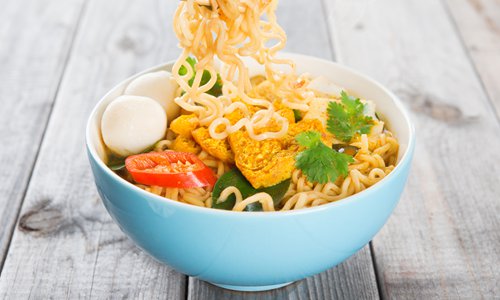
A bowl of instant noodles served Photo: IC
South Korea's Nongshim has taken a hit in the European market after a carcinogen was found in its Seafood Ramyun packets, which an analyst said may boost Chinese competitors' exports amid rising demand for instant food during the pandemic.
Ethylene oxide - classified as a class-one carcinogen by the International Cancer Research Institute - has been found in Nongshim's Seafood Ramyun packets sold in Germany, South Korean news portal the Korea Times reported, citing the European Commission's Rapid Alert System for Food and Feed (RASFF).
The affected instant noodles were produced on January 27 and March 3 this year, and the ethylene oxide concentrations in the products were more than 148 times over the EU standard, the report said, adding that the RASFF immediately ordered a Europe-wide ban on the sale of these specific packages of Nongshim's Seafood Ramyun.
"The food security issue that's affecting South Korea's top instant noodle maker may benefit China's instant food exports, though the impact may last no more than half a year," Zhu Danpeng, a veteran analyst in the food industry, told the Global Times on Sunday.
According to industry analysis platform chyxx.com, China exported 174,700 tons of instant noodles between January and November 2020, far outpacing its imports of 71,900 tons.
As many people worldwide remain at home or in quarantine due to the pandemic, a range of China-made instant foods has gained popularity around the world.
Chinese instant noodles continue to gain popularity in Africa and Southeast Asia, and frozen instant noodles made in Taizhou, East China's Jiangsu Province have started to enter markets like Europe and the US, with sales surging 64 percent between January and July this year, customs data showed.
The food security scandal of Nongshim may also have a negative impact on South Korea's exports of instant noodles to the huge Chinese market, according to Zhu.
On Chinese Twitter-like social media Sina Weibo, the hashtag "Carcinogen found in Nongshim's instant noodles" began trending on Saturday, with netizens expressing concern about the safety of the brand's instant noodles they have bought.
Customer service agents at Nongshim's flagship stores on Chinese e-commerce platforms told the Global Times that there were customers inquiring about the safety of Nongshim instant noodles following the news, but they declined to disclose the amount of goods returned.
"The Nongshim seafood instant noodles sold in Chinese online stores are different from those exported to Europe, and Chinese consumers do not need to worry about food safety issues of these products," a customer service agent said.
Global Times




